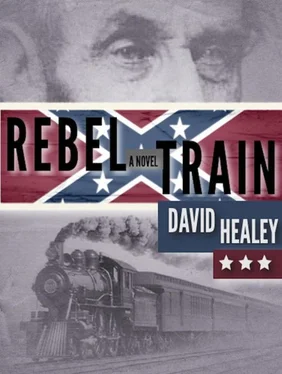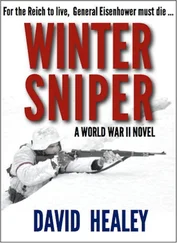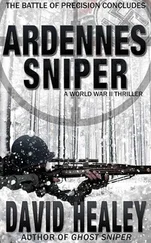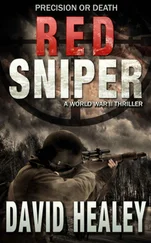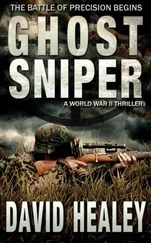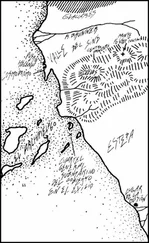“Look out!” Despite his surprise, Prescott managed to shout a warning. “It’s one of the Rebels!”
The men surrounding Lincoln did not have a chance to react. Percy’s revolver was aimed at Lincoln’s heart by the time Prescott managed to shout a warning. Too late, Major Rathbone lunged forward, trying to use his body as a shield in front of the president.
“Assassin!” Rathbone shouted.
Rifle fire cracked. Three bullets struck Percy all at once. The force of the bullets spun him around and Percy fell, sprawling, the revolver still gripped tightly in his hand. Percy had never pulled the trigger. His body rolled in the dust and lay still.
The soldiers on the platform had been watching the strange man intently, sensing trouble, and they reacted when they saw him run forward with a revolver. Now they stood with smoking rifles, staring at the body. Silence fell over the train station.
Calmly, the president broke away from the small group of men surrounding him and walked over to the figure on the ground. He stood for a moment, staring down at the body. He stooped to pick something up, his long body seeming to take a long time to bend toward the ground. He stood back up holding a pair of eyeglasses, the frame twisted and one of the lenses cracked.
“He was one of the raiders?” the president asked Prescott, without looking up.
“Yes, sir. He was the leader of the train raid, Mr. President,” Prescott replied. Normally, he would have felt a pompous importance at providing information for the president, but the sudden violence had left him shaken. “His name was Colonel Arthur Percy.”
“Ah. I remember that I spoke to him through the door,” Lincoln said. “How did he get here?”
“I’ve been wondering the same thing, sir,” Major Rathbone said. “He must have hidden himself aboard the train somehow. I don’t know where — it’s possible he was under the tender. That’s about the only place he could have been.”
“Remarkable,” the president said. He added, as if to himself, “Why must we kill such men?”
“Because he was a Rebel, sir,” the major said. “And he was about to kill you , from the looks of it.”
The president nodded. Already, the incident at the train station was starting to draw attention. The dedication ceremony was ending, and people were beginning to drift back into town. Some townspeople looked curiously at the dead man on the ground, while others gawked at the tall figure in the dark suit and stovepipe hat, pointing him out to their companions.
Major Rathbone immediately ordered two of the soldiers who had shot Percy to take the body away. He then touched the president’s arm, guiding him back toward the train.
A throng of people was just reaching the train station as the crowds spread through town. One of the passersby, a bony man with a black patch over his left eye, stopped to stare after the body being carried away. “What happened to that one?” the one-eyed man asked the lone soldier left on the platform.
The corporal was about to explain, but stopped when he saw the sharp look Major Rathbone gave him. “He just went crazy and got himself shot,” was all that the corporal said.
“Is that right?” the man with the eye patch said. He looked doubtful.
“Well, that’s what happened,” the corporal insisted, although he didn’t sound too sure of himself.
“Move along, sir,” Major Rathbone said pointedly. “The excitement is over.”
“I’m sorry I missed it,” the one-eyed fellow said. “I suppose it was more interesting than the speechifying.”
“Move along,” Rathbone repeated.
“That Mr. Everett gave a fine oration, but awful long,” the man said, ignoring Rathbone and using his one good eye to peer closely at the figure in the stovepipe hat. “President Lincoln hardly spoke at all. He got up there and sat back down before you knew it. We couldn’t even hear him in back. Why, for all we know it could have been anyone making that speech.”
The tall, gaunt man was listening intently. People stared at him with puzzled expressions. A low murmuring swelled among the citizens at the depot.
The major touched his elbow again. “Mr. President?”
Abraham Lincoln put his folded sheaf of papers in his coat pocket, took a last look at the dead Rebel being carried away through the crowd beginning to fill Gettysburg’s streets, and climbed back aboard the train.

David Healey lives in Maryland where he has worked as a journalist and community college instructor. He is also the author of two other Civil War novels, Sharpshooter and Rebel Fever . Visit him online at www.davidhealey.net.
